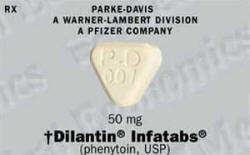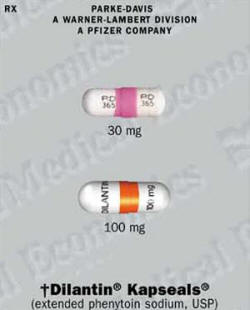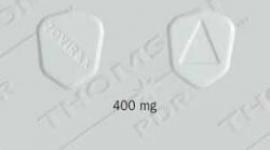Dilantin (Phenytoin Sodium) Patient Information
Find out why Dilantin is prescribed, side effects of Dilantin, Dilantin warnings, effects of Dilantin during pregnancy, more - in plain English.
Generic name: Phenytoin sodium
Brand name: Dilantin
Pronounced: dye-LAN-tin
Dilantin (phenytoin sodium) Full Prescription Information
Why is Dilantin prescribed?
Dilantin is an antiepileptic drug, prescribed to control grand mal seizures (a type of seizure in which the individual experiences a sudden loss of consciousness immediately followed by generalized convulsions) and temporal lobe seizures (a type of seizure caused by disease in the cortex of the temporal [side] lobe of the brain affecting smell, taste, sight, hearing, memory, and movement).
Dilantin may also be used to prevent and treat seizures occurring during and after neurosurgery (surgery of the brain and spinal cord).
Most important fact about Dilantin
If you have been taking Dilantin regularly, do not stop abruptly. This may precipitate prolonged or repeated epileptic seizures without any recovery of consciousness between attacks--a condition called status epilepticus that can be fatal if not treated promptly.
How should you take Dilantin?
It is important that you strictly follow the prescribed dosage regimen and tell your doctor about any condition that makes it impossible for you to take Dilantin as prescribed.
If you are given Dilantin Oral Suspension, shake it well before using. Use the specially marked measuring spoon, a plastic syringe, or a small measuring cup to measure each dose accurately.
Swallow Dilantin Kapseals whole. Dilantin Infatabs can be either chewed thoroughly and then swallowed, or swallowed whole. The Infatabs are not to be used for once-a-day dosing.
Do not change from one form of Dilantin to another without consulting your doctor. Different products may not work the same way.
Depending on the type of seizure disorder, your doctor may give you another drug with Dilantin.
--If you miss a dose...
If you take one dose a day, take the dose you missed as soon as you remember. If you do not remember until the next day, skip the missed dose and go back to your regular schedule. Do not take 2 doses at once.
If you take more than 1 dose a day, take the missed dose as soon as possible. If it is within 4 hours of your next dose, skip the one you missed and go back to your regular schedule. Do not take 2 doses at once.
If you forget to take your medication 2 or more days in a row, check with your doctor.
--Storage instructions...
Store at room temperature away from light and moisture.
What side effects may occur when taking Dilantin?
Side effects cannot be anticipated. If any develop or change in intensity, inform your doctor as soon as possible. Only your doctor can determine whether it is safe for you to continue taking Dilantin.
-
More common side effects of Dilantin may include: Decreased coordination, involuntary eye movement, mental confusion, slurred speech
-
Other side effects may include: Abnormal hair growth, abnormal muscle tone, blood disorders, coarsening of facial features, constipation, dizziness, enlargement of lips, fever, headache, inability to fall asleep or stay asleep, joint pain, nausea, nervousness, overgrowth of gum tissue, Peyronie's disease (a disorder of the penis that causes the penis to bend on an angle during erection, often making intercourse painful or difficult), rapid and spastic involuntary movement, skin peeling or scaling, skin rash, tremors, twitching, vomiting, yellowing of skin and eyes
Why should Dilantin not be prescribed?
If you have ever had an allergic reaction to or are sensitive to phenytoin or similar epilepsy medications such as Peganone or Mesantoin, do not take Dilantin. Make sure your doctor is aware of any drug reactions you have experienced.
Special warnings about Dilantin
Tell your doctor if you develop a skin rash. If the rash is scale-like, characterized by reddish or purplish spots, or consists of (fluid-filled) blisters, your doctor may stop Dilantin and prescribe an alternative treatment. If the rash is more like measles, your doctor may have you stop taking Dilantin until the rash is completely gone.
Because Dilantin is processed by the liver, people with impaired liver function, older adults, and those who are seriously ill may show early signs of drug poisoning.
Practicing good dental hygiene minimizes the development of gingival hyperplasia (excessive formation of the gums over the teeth) and its complications.
Avoid drinking alcoholic beverages while taking Dilantin.
Possible food and drug interactions when taking Dilantin
If Dilantin is taken with certain other drugs, the effects of either could be increased, decreased, or altered. It is especially important to check with your doctor before combining Dilantin with the following:
Alcohol
Amiodarone (Cordarone)
Antacids containing calcium Blood-thinning drugs such as Coumadin
Chloramphenicol (Chloromycetin)
Chlordiazepoxide (Librium)
Diazepam (Valium)
Dicumarol
Digitoxin (Crystodigin)
Disulfiram (Antabuse)
Doxycycline (Vibramycin)
Estrogens such as Premarin
Felbamate (Felbatol)
Fluoxetine (Prozac)
Furosemide (Lasix)
Isoniazid (Nydrazid)
Major tranquilizers such as Mellaril and Thorazine
Methylphenidate (Ritalin)
Molindone hydrochloride (Moban)
Oral contraceptives
Phenobarbital
Quinidine (Quinidex)
Reserpine (Diupres)
Rifampin (Rifadin)
Salicylates such as aspirin
Seizure medications such as Depakene, Depakote, Tegretol, and Zarontin
Steroid drugs such as prednisone (Deltasone)
Sucralfate (Carafate)
Sulfa drugs such as Gantrisin
Theophylline (Theo-Dur, others)
Tolbutamide (Orinase)
Trazodone (Desyrel)
Ulcer medications such as Tagamet and Zantac
Tricyclic antidepressants (such as Elavil, Norpramin, and others) may cause seizures in susceptible people, making a dosage adjustment of Dilantin necessary.
Hyperglycemia (high blood sugar) may occur in people taking Dilantin, which blocks the release of insulin. People with diabetes may experience increased blood sugar levels due to Dilantin.

Abnormal softening of the bones may occur in people taking Dilantin because of Dilantin's interference with vitamin D metabolism.
Special information if you are pregnant or breastfeeding
If you are pregnant or plan to become pregnant, inform your doctor immediately. Because of the possibility of birth defects with antiepileptic drugs such as Dilantin, you may need to discontinue the drug. Do not, however, stop taking it without first consulting your doctor. Dilantin appears in breast milk; breastfeeding is not recommended during treatment with this drug.
Recommended dosage for Dilantin
 Dosage is tailored to each individual's needs. Your doctor will monitor blood levels of the drug closely, particularly when switching you from one drug to another.
Dosage is tailored to each individual's needs. Your doctor will monitor blood levels of the drug closely, particularly when switching you from one drug to another.
ADULTS
Standard Daily Dosage
If you have not had any previous treatment, your doctor will have you take one 100-milligram Dilantin capsule 3 times daily to start.
On a continuing basis, most adults need 1 capsule 3 to 4 times a day. Your doctor may increase that dosage to 2 capsules 3 times a day, if necessary.
Once-A-Day Dosage
If your seizures are controlled on 100-milligram Dilantin capsules 3 times daily, your doctor may allow you to take the entire 300 milligrams as a single dose once daily.
CHILDREN
The starting dose is 5 milligrams per 2.2 pounds of body weight per day, divided into 2 or 3 equal doses; the most a child should take is 300 milligrams a day. The regular daily dosage is usually 4 to 8 milligrams per 2.2 pounds. Children over 6 years of age and adolescents may need the minimum adult dose (300 milligrams per day).
Overdosage of Dilantin
An overdose of Dilantin can be fatal. If you suspect an overdose, seek medical attention immediately.
Symptoms of Dilantin overdose may include: Coma, difficulty in pronouncing words correctly, involuntary eye movement, lack of muscle coordination, low blood pressure, nausea, sluggishness, slurred speech, tremors, vomiting
APA Reference
Staff, H.
(2009, January 3). Dilantin (Phenytoin Sodium) Patient Information, HealthyPlace. Retrieved
on 2025, November 25 from https://www.healthyplace.com/other-info/psychiatric-medications/dilantin-phenytoin-sodium-patient-information
